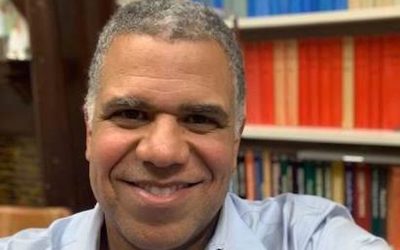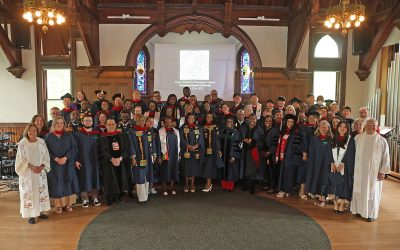An essay by the Master of Divinity alumna.
Essay on Matthew 13: Have You Had Your Soil Tested Lately?
In the famous parable from Matthew 13, Jesus is speaking to a growing crowd, and so moves onto a boat offshore to amplify his voice and give himself a podium. He immediately begins speaking about something the primarily agrarian community would understand: seeds and soil. He tells them about four types of seeds, each one involves a sower sowing the seed. The first one falls on the ground and the birds eat it. The second one falls on the ground with rocky soil and does not develop roots and when the sun comes it scorches the roots and it dies. A third type of seed is sown and falls among thorns, and is choked out. And then there is the fourth type of seed sown, which falls on “good soil,” as Jesus says in Matthew 13:8, “Other seeds fell on good soil and brought forth grain, some a hundredfold, some sixty, some thirty.” And in Matthew 13:9, “Let anyone with ears listen!” Lastly, “Hear then the parable of the sower,” says Jesus in Matthew 13:18. He indicates this is the harvest we should be seeking, and then goes into an analysis of what is going on in the three other soil conditions, making analogies of it relating to our heart and our will. He comes back to the “good soil” and those who have “heard.”
So what is the parable about? Is it about a sower? Well, does the sower really have anything measurable to do with this? Doesn’t the sower drop the seed four times equally? There was nothing that the sower did differently in dropping the seed from one place to another other than the location where the sower happened to be. What about the seed, is there anything different with the seed? Nope, it appears all of the seed of this crop were the same, so there wasn’t one set of seeds that were magic, as the fairytale Jack and the Beanstalk suggests.
What is left in this parable then? Though it looks on the surface that it’s about the sower or the seeds, that is a misdirection. There is only one thing that makes any difference in the outcome here, and that one thing is the soil. And guess what that soil represents? You, us, the crowd, the world that Christ is trying to teach how to live if we want to be connected to him. That soil is your heart attitude, and how that soil is tilled and tended is the only thing that is going to matter if you want to see a harvest in your life, in your community, and to see the full fruit of Christian life borne. Does not the Bible say in Matthew 7:15–20 (KJV) “Ye shall know them by their fruit. Do men gather grapes of thorns, or figs of thistles? Even so every good tree bringeth forth good fruit; but a corrupt tree bringeth forth evil fruit. A good tree cannot bring forth evil fruit, neither can a corrupt tree bring forth good fruit.”
So I am going to jump in and ask you a few questions: What is the condition of the soil of your heart? Have you had the soil of your heart tested lately? What or who is choking out the potency of the seed that has been planted? How are you denying the sunlight and water that seed needs? Are resentments and unhealed hurts choking out what wants to flourish in your life? Is the love of money, possessions or self-righteousness creating a dry and barren ground where the love of God cannot take root? Are there persons or habits or thoughts holding power over your life that are stealing the seed from the ground, like hungry birds, scavenging for anything they can find to hold onto, while depriving you of the real fruit of a divinely filled life?
And now I’m going to ask you another, equally vital question. What are you doing in your life, consciously or unconsciously, with awareness or unawareness, intentionally or inadvertently to be ruining the soil of another? Not all soil is created equal—the whole purpose of this passage is that Jesus is showing us that the development of the unequal soil of this world is on us, not him. That is why he is talking to the crowd, the people, because he is showing the world what is right action, and what is wrong action. He is giving ethical instruction—in gardening metaphor—on how to work toward “right action” if we want to create his “kin-dom,” “heaven on earth,” Doesn’t the Lord’s Prayer say “On earth as it is in heaven?” We as Christians are supposed to be actively creating heaven on earth, not waiting to get transported to heaven to create heaven on earth with the “magical powers” we think we are going to acquire. If that’s your approach, you’re taking up valuable space. Christ came as Emmanuel, God with us, and walked his teaching journey of “heavenly behavior” in his humanness, purposely eschewing his divine power to show us the power of action and creation we have within our human frame.
So when we both pollute the soil literally, and well as don’t share the harvest, we are creating wrong action. When, according to a now famous Brookings Institute study, we see that in the U.S., the typical white family’s net worth is $171,000, and the typical black family’s net worth is ten times lower at $17, 150 in 2016, there is only one conclusion we can come to. We, as a society, as a community, have made the soil unequal, untillable for some, and excluded many others. And “excluded others” is not limited to racial economic inequality, but additionally to those who are marginalized for many reasons: the physically or mentally ill or disabled; women, who we know earn less per dollar than any man, and who are often the head of single parent households, to name a few. We have polluted the soil with structural racism, and pre-designed exclusion, not unlike the Pharisees did with religious legalism, not unlike the Roman overlords whose oppressive taxing structures kept the masses impoverished, and failed to share the harvest we reaped. As a corporate body of people, we have all failed to share the harvest, and clear up the toxic soil we created, and the day has come when literally, payment is due.
Literally and figuratively, we are affecting our harvest of good fruit in this country and the world. We are showing Jesus that “we either do not hear, or do not understand, or both,” as he has said in the last line of this parable: 13:23 “But as for what was sown on good soil, this is the one who hears the word and understands it, who indeed bears fruit and yields, in one case a hundredfold, in another sixty, and in another thirty.” Jesus is telling us to hear and understand, and if we have truly heard what he said, and not what we wanted to hear, or what those in control of society to retain power wanted us to hear, we would act. How do I know this? Because the word used in the Greek here is eisakouo, meaning to both hear and obey or heed. It implies action.
Every day we have a new opportunity to till the soil of our heart; every day we have the opportunity to make the soil equally harvestable for all. We complain because we do not have – we are sad because others do not have also. But where is our digging out the stones of our heart? Where is our pulling out the weeds? How are we watering and feeding the soil so as to produce a bountiful harvest? Jesus has told us how; and he told it to all because we cannot do it alone, we need to do it together. It is truly our “common ground.”



